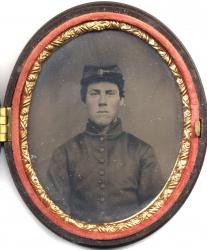
Major Abner R. Small of the 16th Maine Infantry, ca. 1861
Item Contributed by
Maine Historical Society
Images from Maine Historical Society
Formed in the summer of 1862 for three years of service, the 16th Maine Infantry Regiment had a number of officers with previous experience as well as many eager recruits. Some joined just to be part of the war effort and others were drawn by the bounties offered for service.
Formed in the summer of 1862 for three years of service, the 16th Maine Infantry Regiment had a number of officers with previous experience as well as many eager recruits. Some joined just to be part of the war effort and others were drawn by the bounties offered for service.
Lt. Col. Charles W. Tilden of Castine and his assistant, Major Augustus B. Farnham of Bangor, both had served in the Second Maine. Major Abner R. Small of Waterville, the adjutant, previously was a sergeant in the Third Maine Regiment.
In the preface to Major Small's history of the regiment, James Hall wrote, "Having carefully studies much of the history of the various organizations which composed the grand old army, I fail to find any regimental record superior to the Sixteenth Maine, especially at Fredericksburg, and at Gettysburg, July 1st, 1863."
Small wrote in his history, "Boys of today may think it fun to be a private soldier, but it isn't. The picturesque blue and scarlet uniform and jaunty laced cap, or symmetrical helmet, seen in cuts, are very deceptive; and the whole soldierly make-up of a picture is misleading." He went on the describe ill-fitting uniforms, poor shoes, the introduction of lice and wood ticks.
When the new regiment was ordered to the front on August 17, 1862, Small wrote, "cheer after cheer rent the air."
The 16th Maine fought at South Mountain, Antietam, Fredericksburg, Chancellorsville, Gettysburg, the Wilderness, Spotsylvania, Cold Harbor, Petersburg, Weldon Railroad, New Market Heights, Hatcher's Run, and Five Forks.
Describing the action on Cemetery Ridge at Gettsyburg on July 3, 1863, Small wrote, "Our ammunition was reduced to a few rounds, and there came a signal from Little Round top that the dense smoke afforded a screen for the enemy, behind which they were rapidly massing for the charge. ... The veterans of Virginia, the flower of the rebel army, under its idolized commander, were writing another bloody chapter in the history of the rebellion."
He goes on to describe the losses on both sides as well as those captured as prisons. On July 4, he wrote, "The remnant of the Sixteenth is sadly depressed."
Nevertheless, the actions of the 16th Maine, "sacrificed to steady the retreat," helped to insure the Union victory.
Small was taken prisoner at Weldon Railroad on Aug. 18, 1864 and held until Feb. 22, 1865. He kept a diary of his prison experiences.






















